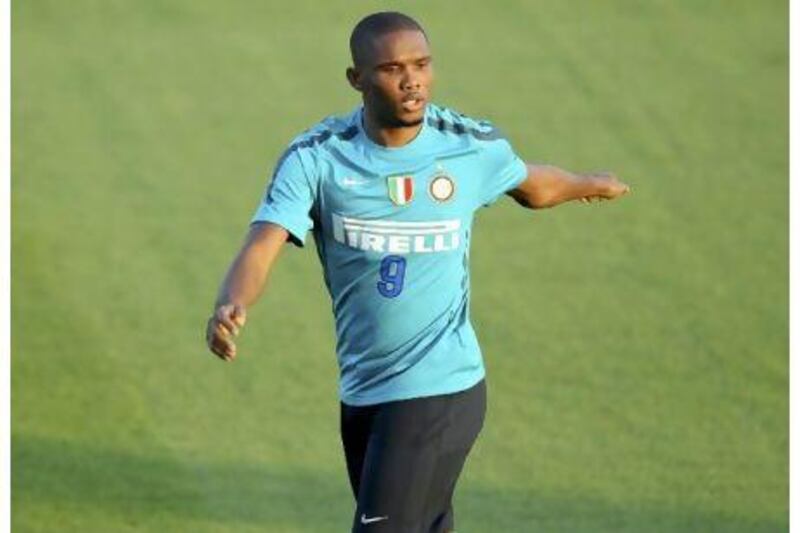When Samuel Eto'o lived in Barcelona, his home, close to seaside, had a trophy room.
Displayed on shelves were a wide variety of baubles, statuettes and souvenirs he had collected, the eye drawn in particular to a large Pharaonic-style bust awarded to him for excellence in African football.
A full audit of the many other prizes he has won would fill several pages, so let's start with the globally recognised awards.
It is still a long list. Last May, Eto'o won the Champions League for the third time, his success with Inter Milan arriving 12 months after the second of his two Champions League triumphs with Barcelona, the 2006 and 2009 finals, in each of which he scored.
Technically, Eto'o has been on the winning side four times in the Champions League: he was a Real Madrid player in 2000 when that club lifted Europe's most important club prize, though he had not established a place in the first-team there. Retrospect tells us that it was Real's mistake, not the player's.
Besides holding the titles of Italian league champion and Coppa Italia winner, there are three Spanish league wins with Barca - plus one with Real, again with a minor part - and a pair of Spanish Cups, including one with Real Mallorca, which he said he values more than any other medal because it was achieved with a club, led valiantly by the young Eto'o in 2003, who had never known such heights before. You can add a fistful of domestic Super Cups.
Not many boxes are unchecked in the long CV of Samuel Eto'o in club football, but the Club World Cup is one.
He was a fringe employee when Real won the Intercontinental Cup in 1998 and no longer a Barcelona player when they triumphed in Abu Dhabi last year. It will feel important to him that he makes amends this time, with Inter.
Important, too, because for all his club achievements, for all that they strengthen the case that Eto'o has been the best centre-forward in the world during the first decade of the 21st century, his international honours are not quite as plentiful.
Eto'o is from Cameroon, where he was born 29 years ago, and though he has captained and led from the front one of the strongest African football nations, his three World Cups have been disappointing, not least the 2010 expedition, which ended with three defeats.
He has been his native continent's Footballer of the Year three times, won the African Cup of Nations twice, but also, more recently, finished as a runner-up twice in that tournament. Victory in the Club World Cup would add a truly global title to the Olympic Gold medal he won with Cameroon in Sydney more than 10 years ago. It was in that year that the world first took note of Eto'o's brilliance, his speed, dexterity and determination.
He had joined Real as a 16-year-old, but their patient approach to his development - they kept sending him out on loan which gave him sparse outings - clashed with his eagerness to fill the big stages.
He was young but bumptious, as exhibited in a story he tells of his first senior international final, the African Nations Cup in Lagos in 2000. Cameroon were underdogs against a strong Nigeria playing at home. The atmosphere at the Surulere stadium, it hardly needs adding, felt intense.
The teams bristled at one another in the tunnel before kick off. Nigeria's muscle-bound defender, Taribo West, the former Inter player, approached the lithe, teenaged Eto'o to intimidate him: "You know me," West said, menacingly. "And today you're going to get to know me even better."
Quick as a flash, Eto'o turned to another Nigeria player, to say: "Tell your friend Taribo, 'Yeah, I've seen him on TV, and today he's going to learn much better what I am about.'" Within 26 minutes Eto'o had opened the scoring, to eerie silence around Surulere. Cameroon would win the game on penalties.
That sort of defiance has been a characteristic. He has had his flashes of anger, like the butt last month on a Chievo player that got him a three-match ban in Serie A.
But Eto'o also has become one of the sport's leading campaigners against racism from crowds in Europe.
His early Madrid experience, when he failed to break into the first-team, left him with an evident hunger to prove himself. He has done that, again and again.
This season, he has been Inter's best, most-effective player, the man whom his colleagues, many of whom have struggled with fitness and form, will look to deliver the last big prize of their glorious year.






